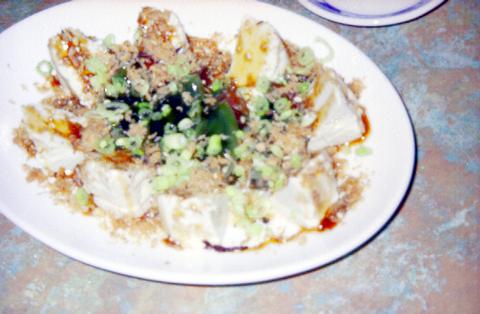Dai's House of Stinky Tofu has another name in Chinese -- House of Unique Stink. It may sound funny to foreigners who are loathe to try the unique dish, but after visiting Dai's, one may find that stinky tofu really doesn't taste as bad as it smells.
Almost every dish at Dai's is made using stinky tofu. There are the typical tofus; steamed, stir-fried, and grilled, but Dai's is the only place in the world, according to owner Wu Hsu Pi-ying (
Decades ago, stinky tofu was a military staple for soldiers patrolling China's borders. But as Taiwan's night-market culture developed, so did stronger, spicier and more diverse flavors of stinky tofu.

PHOTO: YU SEN-LUN
Unlike most night-market stinky tofu stands where the odor permeates the air, Dai's house is simply a clean, ordinary restaurant with a huge Crouching Tiger poster on the wall.
Film director Lee Ang (
The somewhat freaky cold stinky tofu (涼拌臭豆腐) is actually quite refreshing -- similar to, but milder than blue cheese. With its soft and dense texture, it's served with shredded scallions in a light soy sauce and is recommended as a starter.
The raw tofu adds a new line to Dai's 50-year-old menu and is, according to Wu, the healthiest way to try stinky tofu.
In some places, you really don't want to know how the tofu is made, said Wu. Long ago, some used rotting seafood to ferment the bean curd while others used chemicals. But Dai's products are all vegetarian, using amaranth, mustard leaf, bamboo shoots and more than 10 kinds of Chinese herbs to ferment the bean curd for six months, said Wu.
Pure vegetarianism has turned Dai's stinky tofu into something of an urban legend. Seven years ago, Tsinghua University's (
Fried stinky tofu is the least pungent and therefore more suitable for first-timers. The fried tofu of the house (招牌炸) is Dai's flagship dish and has extra-crispy skin and smooth tofu inside. Try mixing the four sauces into your own blend: soy sauce, garlic and radish pastes and chili sauce.
For solo visitors, the tofu fried noodles with spicy and sour sauce (

The unexpected collapse of the recall campaigns is being viewed through many lenses, most of them skewed and self-absorbed. The international media unsurprisingly focuses on what they perceive as the message that Taiwanese voters were sending in the failure of the mass recall, especially to China, the US and to friendly Western nations. This made some sense prior to early last month. One of the main arguments used by recall campaigners for recalling Chinese Nationalist Party (KMT) lawmakers was that they were too pro-China, and by extension not to be trusted with defending the nation. Also by extension, that argument could be

Aug. 4 to Aug. 10 When Coca-Cola finally pushed its way into Taiwan’s market in 1968, it allegedly vowed to wipe out its major domestic rival Hey Song within five years. But Hey Song, which began as a manual operation in a family cow shed in 1925, had proven its resilience, surviving numerous setbacks — including the loss of autonomy and nearly all its assets due to the Japanese colonial government’s wartime economic policy. By the 1960s, Hey Song had risen to the top of Taiwan’s beverage industry. This success was driven not only by president Chang Wen-chi’s

Last week, on the heels of the recall election that turned out so badly for Taiwan, came the news that US President Donald Trump had blocked the transit of President William Lai (賴清德) through the US on his way to Latin America. A few days later the international media reported that in June a scheduled visit by Minister of National Defense Wellington Koo (顧立雄) for high level meetings was canceled by the US after China’s President Xi Jinping (習近平) asked Trump to curb US engagement with Taiwan during a June phone call. The cancellation of Lai’s transit was a gaudy

The centuries-old fiery Chinese spirit baijiu (白酒), long associated with business dinners, is being reshaped to appeal to younger generations as its makers adapt to changing times. Mostly distilled from sorghum, the clear but pungent liquor contains as much as 60 percent alcohol. It’s the usual choice for toasts of gan bei (乾杯), the Chinese expression for bottoms up, and raucous drinking games. “If you like to drink spirits and you’ve never had baijiu, it’s kind of like eating noodles but you’ve never had spaghetti,” said Jim Boyce, a Canadian writer and wine expert who founded World Baijiu Day a decade